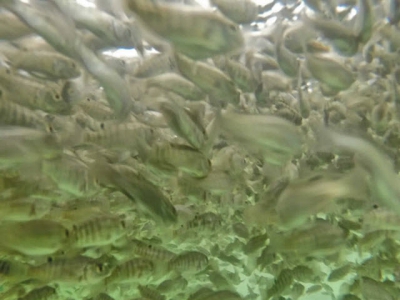Why biosecurity is the best defence against tilapia lake virus

The first confirmed case of tilapia lake virus (TiLV) in the USA emphasises the need for producers to ensure biosecurity is a top priority, according to a leading US tilapia breeder.
Spring Genetics has been routinely screening all its tilapia stocks for TiLV for three years. Photo © Spring Genetics
Last month, USDA APHIS released a statement outlining that the virus – an RNA virus that was previously detected in Asia, Africa, Central and South America – had been reported in Idaho. There is no current treatment or vaccine available.
An underwater image of a shoal of Nile tilapia
“Although this finding was controlled appropriately by the authorities, and the correct measures were taken to avoid losing containment on the outbreak, it highlights the importance of biosecurity and health surveillance programmes,” reflects Hideyoshi Segovia, commercial and operations manager at Spring Genetics.
“It is important for producers to source fingerlings and brood stock from known and trusted sources that have the proper documentation ensuring that their fish are in healthy condition,” adds Segovia.
Spring Genetics, part of Benchmark, has operated a biosecure closed breeding nucleus to which no external fish have been introduced since it was established in 2009. It has been screening against TiLV for the past three years as a standard practice.
The company undergoes a stringent health surveillance programme that screens for known pathogens that cause diseases in tilapia, as well as screening against pathogens that may cause disease and affect tilapia production. It has never detected TiLV in its stock.
The company’s screening programme randomly tests several batches of fish from the nucleus operation, on a quarterly basis, against pathogens such tilapia lake virus (TilV), infectious salmon anaemia virus (ISAV), infectious pancreatic necrosis virus (IPNV), Francisella, Streptococcus, Aeromonas and Edwarsiella, among other key pathogens. In addition, testing is done in every single batch of fish that is being shipped to a client, the testing to these batches is specific to the requirements the importer country demands.
“Spring Genetics subjects itself to the strictest testing possible to protect their clients, OIE testing for all tilapia diseases are completed a minimum of four times per year, and the programme is in place to ensure that we can continue being a trusted source of broodstock and sex-reversed fingerlings for the industry,” Segovia continues.
Spring Genetics is governed by the Florida Department of Aquaculture and has been a permit holder since 2009. The company has been approved by the USDA-APHIS-Veterinary Services as an aquaculture export facility for Oreochromis niloticus (Nile tilapia).
“Acquiring fingerlings from Spring Genetics should represent peace of mind for our clients when it comes to biosecurity and disease risk management. This, coupled with high-quality genetics, and genetic programmes focused on growth, resilience and disease resistance, provides a significant opportunity for our clients to improve the productivity and sustainability of their business,” Segovia concludes.
Related news
 Rediscovering remedies: new methods for treating velvet disease
Rediscovering remedies: new methods for treating velvet disease As EU countries consider banning many chemical therapeutants used in fish farming, researchers suggest using humic substances and hydrogen peroxide sustainable
 Taurine in farmed yellowtail diets may boost reproduction, survival
Taurine in farmed yellowtail diets may boost reproduction, survival Supplemental taurine in farmed yellowtail diets may increase spawning rate, total egg production and improve young fish’s survival rate, say researchers.
 Virus linked to mass tilapia mortalities on Lake Volta
Virus linked to mass tilapia mortalities on Lake Volta A new suspect has emerged in the search for the causes of the massive disease outbreak that has been affecting tilapia on Lake Volta in Ghana.